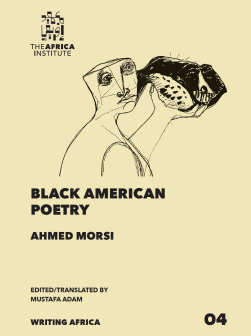The historical significance of this manuscript derives from the fact that it was prepared at a time that coincided with the pinnacle of the civil rights movement and Afro-American awakening. The greatest part of the manuscript is drawn from published seminal works in the field of Afro-American poetry. The author attempts to document for the movement for cultural self-expression, that legitimately deserved to be called “the Age of the Negro Renaissance”. It heralds the birth of a new racial consciousness and self-reflection. It also tries, through chronological tracing, to describe the emergence of what could be called Negro Poetry, reflecting on the contribution of the most renowned black poets over the last two centuries.
A painter, poet, printmaker, and critic, Ahmed Morsi has created a diverse body of work abundant in mythic beauty. After coming of age in the 1940s as part of the Alexandria School, a movement led by free thinkers and artists that marked the city’s emergence as a postwar Mediterranean cultural entrepot, Morsi spent time in Baghdad before moving to Cairo in the late 1950s and eventually emigrating to New York in the 1970s. The Cairo journal he helped lead in the late 1960s and early 1970s, Galerie 68, became the voice of the Egyptian avant-garde, and he has also experimented with theatrical set design and artist’s books.
Mustafa Adam has worked as a lecturer in English Language at several Sudanese universities and in the United Arab Emirates, and he is also an editor and translator to and from English. He has many contributions in academic and literary translation from Arabic and English. Over the years, Adam has translated a wide range of poems and short stories by Sudanese writers and poets and others, including the epic poem: “The Return to Sinner” by Mohamed Abdel-Hay and the poetry of modernist poets in Sudan such as Mohammed al-Makki Ibrahim and Ali Abdelgayyoum and the Palestinian poet Mahmoud Darwish. In addition to co-translating, “The Ottoman Scramble for Africa: Empire and Diplomacy in the Sahara and the Hijaz“, “Al-Salahi: Prison Memoirs” with Adel Babiker, commissioned by the Sharjah Art Foundation, he translated several chapters in several books on art and literature. His translations from English into Arabic include poems by Edwin Muir, Dylan Thomas, W. B. Yeats, and Soyinka. His published translations have appeared in Arablit Quarterly and the South Atlantic Quarterly. Adam holds an MA in English Literature, on the theatre of Harold Pinter, University of Khartoum and an MA in Linguistics, University of Manchester. He currently works as an editor/translator at The Africa Institute, Sharjah.
The historical significance of this manuscript derives from the fact that it was prepared at a time that coincided with the pinnacle of the civil rights movement and Afro-American awakening. The greatest part of the manuscript is drawn from published seminal works in the field of Afro-American poetry. The author attempts to document for the movement for cultural self-expression, that legitimately deserved to be called “the Age of the Negro Renaissance”. It heralds the birth of a new racial consciousness and self-reflection. It also tries, through chronological tracing, to describe the emergence of what could be called Negro Poetry, reflecting on the contribution of the most renowned black poets over the last two centuries.
The historical significance of this manuscript derives from the fact that it was prepared at a time that coincided with the pinnacle of the civil rights movement and Afro-American awakening. The greatest part of the manuscript is drawn from published seminal works in the field of Afro-American poetry. The author attempts to document for the movement for cultural self-expression, that legitimately deserved to be called “the Age of the Negro Renaissance”. It heralds the birth of a new racial consciousness and self-reflection. It also tries, through chronological tracing, to describe the emergence of what could be called Negro Poetry, reflecting on the contribution of the most renowned black poets over the last two centuries.
A painter, poet, printmaker, and critic, Ahmed Morsi has created a diverse body of work abundant in mythic beauty. After coming of age in the 1940s as part of the Alexandria School, a movement led by free thinkers and artists that marked the city’s emergence as a postwar Mediterranean cultural entrepot, Morsi spent time in Baghdad before moving to Cairo in the late 1950s and eventually emigrating to New York in the 1970s. The Cairo journal he helped lead in the late 1960s and early 1970s, Galerie 68, became the voice of the Egyptian avant-garde, and he has also experimented with theatrical set design and artist’s books.
Mustafa Adam has worked as a lecturer in English Language at several Sudanese universities and in the United Arab Emirates, and he is also an editor and translator to and from English. He has many contributions in academic and literary translation from Arabic and English. Over the years, Adam has translated a wide range of poems and short stories by Sudanese writers and poets and others, including the epic poem: “The Return to Sinner” by Mohamed Abdel-Hay and the poetry of modernist poets in Sudan such as Mohammed al-Makki Ibrahim and Ali Abdelgayyoum and the Palestinian poet Mahmoud Darwish. In addition to co-translating, “The Ottoman Scramble for Africa: Empire and Diplomacy in the Sahara and the Hijaz“, “Al-Salahi: Prison Memoirs” with Adel Babiker, commissioned by the Sharjah Art Foundation, he translated several chapters in several books on art and literature. His translations from English into Arabic include poems by Edwin Muir, Dylan Thomas, W. B. Yeats, and Soyinka. His published translations have appeared in Arablit Quarterly and the South Atlantic Quarterly. Adam holds an MA in English Literature, on the theatre of Harold Pinter, University of Khartoum and an MA in Linguistics, University of Manchester. He currently works as an editor/translator at The Africa Institute, Sharjah.

The Africa Institute (Sharjah, UAE)
English
978-9948-775-19-5
13 x 18 cm, paperback
AED 13 | $3.5
2024
Contact usSubscribe to our mailing list and get the latest news from The Africa Institute